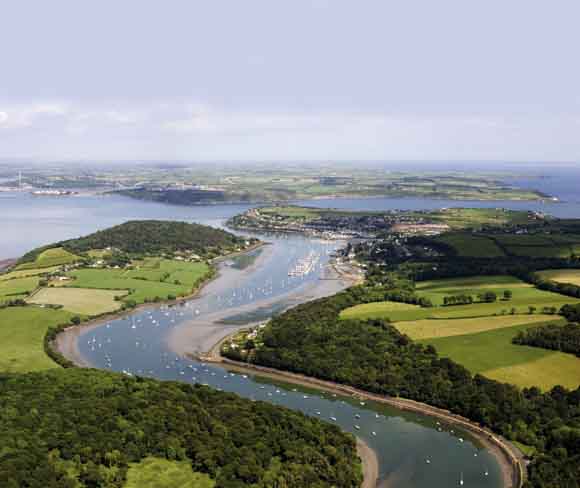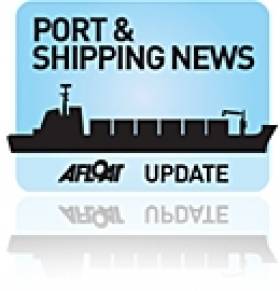Displaying items by tag: Munster
Beachgoers around Munster have been warned to watch where they step after numerous sightings of a venomous fish that lurks in the sand, as the Irish Examiner reports.
Lesser weevers are small fish, only 15cm in length, but their stinging spines pack a painful wallop — and in rare cases can be potentially fatal.
Kevin Flannery of Dingle OceanWorld says weevers generally avoid spots where people congregate on beaches, but may be encountered off the beaten track — so wearing footwear, even flip-flops, is a must.
And if you’re unlucky enough to step on one, get the affected area under hot water — up to 40 degrees if possible — to help break down the venom. The Irish Examiner has more on the story HERE.
Munster is also the place to be to see swarms of jellyfish that have turned up along the Cork coastline in recent days, according to the Irish Mirror.
Thousands of what are believed to be moon jellyfish have been spotted from Garretstown to Cobh in Cork Harbour, likely attracted by warmer waters to feed on their usual diet of plankton, molluscs — and other jellyfish.
Fastnet Line Cancel Tonight's Sailing
Operators of the Cork-Swansea route, Fastnet Line regret to announce that tonight's (13 January) sailing from Cork to Swansea is cancelled. The company has cited technical reasons for the cancellation of the sailing. The 10-hour route linking Munster with South Wales is served by the M.V. Julia.
Fastnet Line are contacting all passengers to assist in making re-bookings or refunds. Those wishing to contact the ferry operators' reservation team for further information can contact the details listed below.
The Julia is to go into dry-dock this week in Swansea. The vessel will remain in Swansea while undergoing annual maintenance up to and including Wednesday 9th February. Her first sailing will be at 20.30hrs from Swansea to Cork on Wednesday 9th February 2011.
To contact the Fastnet Line Irish Reservations Office Tel: +353 (0) 21 4378892 (Open Monday – Friday) 9.00 am - 6.00 pm
To contact the UK Reservations Office Tel: 0844 576 8831
(Open Monday – Thursday) 8.00 am - 8.00 pm
(Open Friday) 8.00 am - 7.00 pm
(Open Saturday and Sunday) 9.00 am - 6.00pm
For further information logon to www.fastnetline.com
Fastnet Ferry Figures Smash 2010 Target
The passenger figure represents four-times the capacity of the Liberty Stadium, Swansea which is to host the rugby Heineken Cup clash between Swansea Neath Ospreys and Munster on Saturday 18 December.
The 10-hour ferry service operated by Fastnet Line also carried 31,000 vehicles and statistics suggest a significant boost for the Swansea Bay economy with about 40% of all passengers so far travelling from Cork to the south Wales region. The route is served by the MV Julia which had been sailing in the Baltic. The 1982 built vessel is capable of carrying more than 1,800 passengers and 400 cars.
Fastnet Line will run all-year-round in 2011 and has set a revised target of 120,000 passengers.
On a seasonal note, Christmas gift vouchers are available from Fastnet Line, for more information logon HERE
Ferry Special 'Munster Rugby' Sailings
After the match supporters can take the bus from Swansea city centre to the ferryport, with departures on the hour at 19.00, 20.00 and 21.00hrs. Passengers check-in times at the terminal are from 19.00hrs and up to 2200hrs. The return sailing departs at 2350hrs on Saturday 18 December and arrives into Cork at 1400hrs on Sunday 19 December.
For information on prices contact Fastnet Line Tel: (021) 4378892 or logon to www.fastnetline.com
Cork Week: The World's Top Fun Regatta
Cork Week – The World's Top Fun Regatta
Since 1978 Cork Week has been setting the bar for Irish Sailing and Afloat Magazine has documented the growth of the biennial event over the past 30 years to the stage today where it is widely regarded as one of the world's top regattas. For all the latest news and updates on Cork Week click here.
Take a small sleepy fishing village. Add water (well, the Atlantic Ocean) and old-fashioned Irish charm. Stir in seven bars, three restaurants, 50 bands, 400 performers and 180 hours of entertainment. Bake in warm sunshine for one week every two years. Sprinkle with 7,000 high-earning visitors.
This is the recipe for success at Cork Week regatta – an icon of Ireland's summer sport that has a bigger reputation overseas than it has at home.

Above: Looking south towards Crosshaven. Photo: Bob Bateman
Competitors come from as far away as the US, Hong Kong, Australia, France, Germany and Belgium. 2006's regatta attracted first time entries from the Philippines, South Africa, Italy and Sweden but the mainstay of the biennial event is a huge representation from England, Scotland and Wales.
Cork Week, of course is not the only regatta of its kind in the world and many copycat events have sprung up across Europe. But Cork continues to have a special mix that lives up to its billing as the number one fun regatta in the world.
For a typical 450 entries, 80% of them would come from overseas, and they are heading here to race but also for the fun.
In many respects Cork Week, when it first started in 1986, took its inspiration from the success of Cowes Week on the Solent but from the beginning Royal Cork Yacht Club (RCYC) organisers wanted to do more than ape a British event.
They saw a gap in the regatta market and took a bold decision to do away with convention and rewrite the rules for sailing regattas. It sounds cliched some 23 years later but they wanted to produce a regatta that was run by sailors for sailors.
What this actually meant was they set about banning professional sailors from attending Cork at a time when regattas across Europe were suffering from the invasion of paid-to-sail crews. It was a situation that left amateur skippers and crews, representing the majority of the sailing community, tired of heading home without any silverware.
The plan was risky, of course, because pros were an influential bunch required to establish the regatta as a credible venue. Banning them was especially problematic for a remote venue on the outskirts of Europe where the high costs of transporting crew and equipment could have kept many away.
But the crews didn’t stay away and the ‘no-pro’ rule, as it became known, has worked in Cork’s favour. Amateur sailors embraced the idea and owners return to Crosshaven year after year to race against each other for a week of Corinthian fun.
Cork went one better by going back out to the professional circuit and inviting pros to a special restricted class within the week where they could race with each other.
In 2004, for example, it attracted some real professional glamour. American Roy Disney came to town, as did the German billionaire Hasso Plattner, both racing massive Z-86 racing machines around Cork harbour. It was a show stopper and put the glitz into Cork.
It hasn't all been plain sailing however. The Cork week organisation has had its difficulties. Four years ago the host club, the RCYC was so intent on having a good time that it lost money on the enterprise. Thankfully it’s now on a firm financial footing again and the event looks stronger than ever.
Around the same time, many Irish sailors began to think that Cork Week had become just the ‘The Solent on tour’.
They were turned off by the high prices of local accommodation for the week. Dublin sailors complained that the successful Crosshaven formula had been over cooked. They resented paying up to 500 Euro to share a bedroom for the week.
Thankfully that too has been ironed out with a bigger range of accommodation now on offer.
But perhaps in the crush most Irish sailors forgot to appreciate just what they have on their own doorstep. Nowhere was this point more clearly made than in early June when the world’s top offshore sailors called in unexpectedly to our south coast.
They came principally in search of wind in leg eight of the Volvo Round the World race. They found little wind, unusually, but before they left they wrote prose worthy of a Failte Ireland copywriter.
In his log, navigator Simon Fisher wrote: “Our day started sailing in and out of the mist rolling down off the hills and, as the sun rose and the mist burnt off, it gave way to spectacular views of rolling green hills and a weather-beaten rocky coastline. With castles and towers stationed on each headland, it gives you the feeling of sailing through a scene out of Lord of the Rings.”
With endorsements like that, it’s easy to see why Crosshaven will teem again with sailors and supporters for a festival of sailing that’s more like Galway Races on water than a regular Irish sailing regatta.
Although Cork Week's not all about rubbing shoulders with serious money, it is hard to ignore the economic value of the event.
Putting a figure on it can be difficult but Cork Week chairman Ian Venner reckons it is worth 10 million Euro to the local economy. It's like Ireland –v– England at Lansdowne road in an otherwise sleepy fishing village.
You can read Cork Week's own history of the event here.





























































